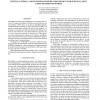244 search results - page 41 / 49 » Location-unaware coverage in wireless sensor networks |
IJSNET
2006
13 years 7 months ago
2006
: To extend the functional lifetime of battery-operated Wireless Sensor Networks (WSNs), stringent sleep scheduling strategies with communication duty cycles running at sub-1% rang...
SENSYS
2006
ACM
14 years 1 months ago
2006
ACM
Varying interference levels make broadcasting an unreliable operation in low-power wireless networks. Many routing and resource discovery protocols depend on flooding (repeated pe...
AINA
2007
IEEE
13 years 11 months ago
2007
IEEE
Abstract--Monitoring and automatic control of building environment is a crucial application of Wireless Sensor Network (WSN) in which maximizing network lifetime is a key challenge...
IJSNET
2006
13 years 7 months ago
2006
: In this paper, we present a two-tiered scheduling approach for effective energy conservation in wireless sensor networks. The effectiveness of this mechanism relies on dynamicall...
IPSN
2005
Springer
14 years 28 days ago
2005
Springer
Surveillance has been a typical application of wireless sensor networks. To conduct surveillance of a given area in real life, one can use stationary watch towers, or can also use...

